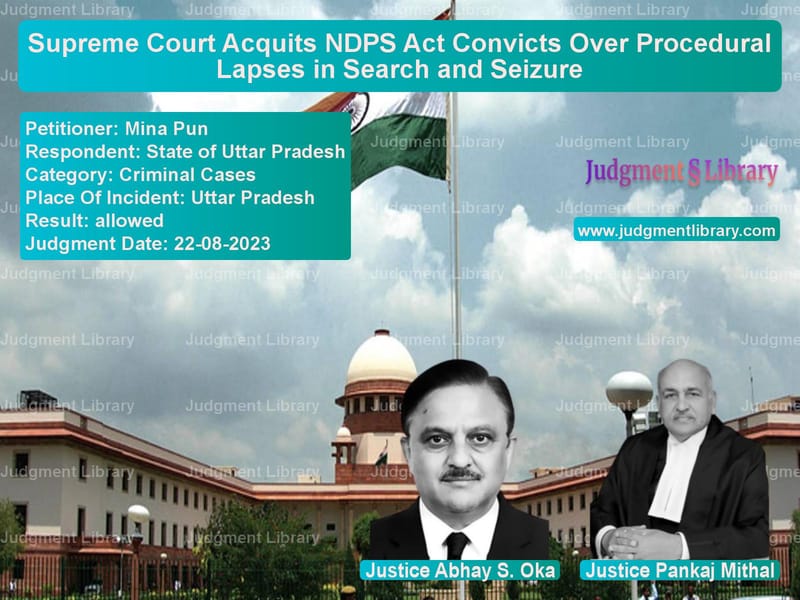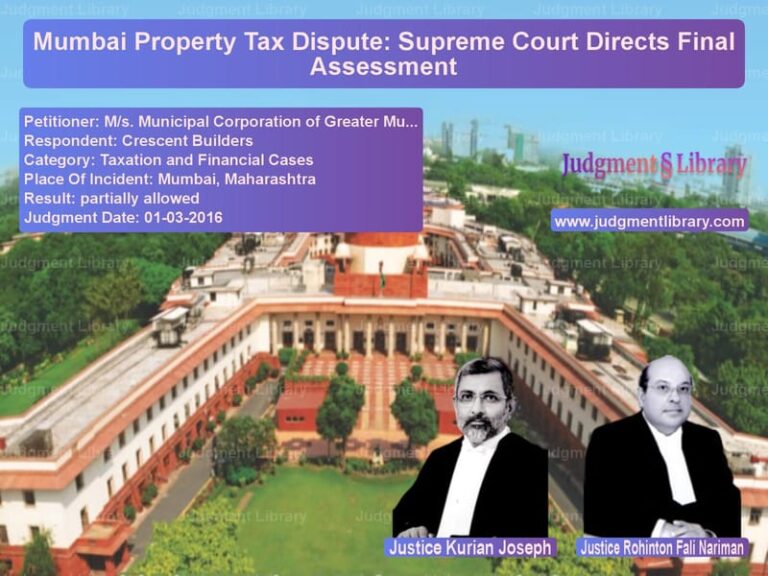Supreme Court Acquits NDPS Act Convicts Over Procedural Lapses in Search and Seizure
The case of Mina Pun vs. State of Uttar Pradesh involved a critical legal issue under the Narcotic Drugs and Psychotropic Substances Act, 1985 (NDPS Act). The Supreme Court, in its judgment, overturned the conviction of the appellants due to a violation of procedural safeguards under Section 50 of the NDPS Act. The appellants were initially convicted under Section 20(b)(ii)(C) of the NDPS Act and sentenced to ten years of rigorous imprisonment along with a fine of Rs.1,00,000. However, after hearing the appeals, the Court held that the mandatory provisions concerning search and seizure were not followed, leading to the acquittal of the appellants.
Background of the Case
The appellants had already undergone the entire substantive sentence of ten years and had also served an additional six months in default of fine payment. Despite their conviction being upheld by the High Court, they challenged the legality of the search and seizure conducted by the police, arguing that their fundamental rights under the NDPS Act were violated.
The primary issue in the case was whether the search conducted by the police was in compliance with Section 50 of the NDPS Act, which mandates that an accused must be informed of their right to be searched before a Magistrate or a Gazetted Officer.
Arguments Presented by the Petitioner
The appellants, through their counsel Mr. Ajit Sharma, raised a fundamental objection regarding the manner in which the search was conducted. The main points of their argument were:
- There was a clear violation of Section 50 of the NDPS Act, which mandates that a person who is to be searched must be informed of their right to have the search conducted in the presence of a Magistrate or a Gazetted Officer.
- The prosecution’s own witness, Sanjay Singh (PW-4), admitted during cross-examination that a consent letter was prepared in advance, and there was no mention in the consent letter that the accused had been informed of their right to insist on being searched in the presence of a Magistrate or a Gazetted Officer.
- The recovery was made in a public place, yet there was no independent witness present during the search.
- There were inconsistencies in the police records, including a lack of proper documentation regarding the time and manner of the search and seizure.
Arguments Presented by the Respondent
The State of Uttar Pradesh defended the conviction on the following grounds:
- The accused had voluntarily agreed to a body search, and a consent letter was obtained from them.
- The contraband was recovered from the accused, and the evidence against them was sufficient to sustain the conviction.
- The procedural lapse, if any, did not affect the substance of the case, as the accused were found in possession of the illicit substance.
Key Observations of the Supreme Court
The Supreme Court examined the case in light of the precedent set in Vijaysinh Jadeja vs. State of Gujarat, where a Constitution Bench had ruled that non-compliance with Section 50 of the NDPS Act vitiates the conviction. The Court held:
“It is imperative for the empowered officer to inform the person concerned about the existence of his right that if he so requires, he shall be searched before a Gazetted Officer or a Magistrate. Failure to ‘inform’ the suspect about the existence of his said right would cause prejudice to him, and any recovery made in violation of this provision cannot be relied upon to convict the accused.”
The Court also noted that the objective of Section 50 is to prevent misuse of power, protect the rights of accused persons, and ensure fairness in criminal trials.
Impact of the Judgment
This judgment reaffirms that adherence to procedural safeguards is essential in NDPS Act cases. It emphasizes that failure to comply with these safeguards not only undermines the fairness of the trial but also renders the conviction unsustainable.
The Supreme Court concluded that since the prosecution failed to comply with Section 50 of the NDPS Act, the conviction could not stand. The Court, therefore, set aside the conviction and directed the immediate release of the appellants.
Final Judgment
The Supreme Court allowed the appeals and acquitted the appellants of all charges. It directed that if the appellants were still in custody, they should be released immediately. If they were already on bail, their bail bonds were to stand canceled.
The case highlights the importance of following due process and procedural safeguards in criminal trials. It serves as a reminder that procedural violations can render an otherwise strong case legally unsustainable.
This judgment sets a crucial precedent in NDPS Act cases and reinforces the principle that justice must not only be done but must also be seen to be done.
Petitioner Name: Mina Pun.Respondent Name: State of Uttar Pradesh.Judgment By: Justice Abhay S. Oka, Justice Pankaj Mithal.Place Of Incident: Uttar Pradesh.Judgment Date: 22-08-2023.
Don’t miss out on the full details! Download the complete judgment in PDF format below and gain valuable insights instantly!
Download Judgment: mina-pun-vs-state-of-uttar-prade-supreme-court-of-india-judgment-dated-22-08-2023.pdf
Directly Download Judgment: Directly download this Judgment
See all petitions in Drug Possession Cases
See all petitions in Bail and Anticipatory Bail
See all petitions in Judgment by Abhay S. Oka
See all petitions in Judgment by Pankaj Mithal
See all petitions in allowed
See all petitions in supreme court of India judgments August 2023
See all petitions in 2023 judgments
See all posts in Criminal Cases Category
See all allowed petitions in Criminal Cases Category
See all Dismissed petitions in Criminal Cases Category
See all partially allowed petitions in Criminal Cases Category







